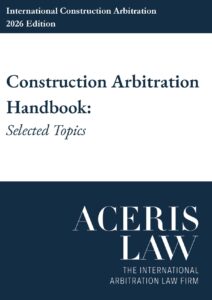On 23 July 2025, the International Court of Justice (ICJ) delivered its long-awaited Advisory Opinion Obligations of States in Respect of Climate Change.[1] The opinion is widely described as a “landmark”[2] because it does two things at once: (i) it clarifies what international law already requires of States on climate change, across multiple legal regimes, […]
News
UK Litigation Funding After PACCAR: The Court of Appeal’s Sony v. Neill Reset and the Legislative Waiting Game
On 4 July 2025, the UK Court of Appeal delivered what the litigation funding sector had been waiting for: a practical ruling on the enforceability of litigation funding agreements (“LFAs”).[1] In Sony Interactive Entertainment Europe Ltd & another v. Alex Neill Class Representative Ltd (and related appeals involving Visa, Mastercard and Apple) (“Sony v. Neill”), […]
International Commercial Arbitration in Chile
International commercial arbitration in Chile is governed by a modern statutory framework based on the UNCITRAL Model Law on International Commercial Arbitration (1985), as enacted through Law No. 19,971 on International Commercial Arbitration.[1] Chilean courts have consistently demonstrated a supportive and non-interventionist approach to arbitration, respecting party autonomy and the finality of arbitral awards. As […]
Production-Sharing Agreement (PSA) Arbitrations
In the extractive industries, production-sharing agreement (PSA) arbitration plays a central role in resolving disputes arising from long-term cooperation between foreign investors and host states in the oil and gas sector. Production-sharing agreements form the backbone of these relationships, and international arbitration is most commonly used to address disputes under such contracts. First developed in […]
Aceris Law Proudly Announces William Kirtley’s Continued Recognition by the Lexology Index in International Arbitration
Aceris Law is pleased to announce that William Kirtley has once again been recommended by the Lexology Index (formerly Who’s Who Legal) in the field of international arbitration. Aceris Law would like to express its sincere thanks to its clients and professional colleagues who took the time to share their experiences during the Lexology Index […]
International Arbitration in Portugal
International arbitration in Portugal is governed by the Voluntary Arbitration Act (Law No. 63/2011 of 14 December 2011), which entered into force on 14 March 2012 (the “Arbitration Act”). The Arbitration Act is largely based on the 2006 version of the 1985 UNCITRAL Model Law on International Commercial Arbitration (“UNCITRAL Model Law”), but it also includes […]
A Practical Handbook on International Construction Arbitration
As the year begins, many in the construction industry are reviewing the disputes, claims, and lessons that shaped their projects in 2025. International construction arbitration continues to be demanding, shaped by technically complex records, evolving contractual frameworks, and growing expectations for timely and fair resolution of disputes. Looking ahead, several issues will continue to dominate […]
Aceris Law Secures Another Decisive Victory in an ICC Arbitration Under Swiss Law
Aceris Law is pleased to announce the successful representation of a Croatian company in an ICC arbitration against an Italian counterparty arising from a major industrial construction project in the energy and petrochemical sector in Croatia. The Arbitral Tribunal issued a final award fully upholding the client’s claims, awarding the vast majority of costs in […]
Arbitration in Croatia
Arbitration in Croatia has developed into a credible dispute resolution mechanism, particularly for commercial disputes involving foreign parties. As a signatory to major international arbitration conventions, Croatia offers a legal framework broadly aligned with international standards, while retaining certain local particularities that practitioners should be aware of. Legal Framework Arbitration in Croatia is primarily governed […]








